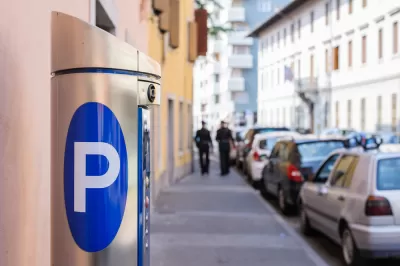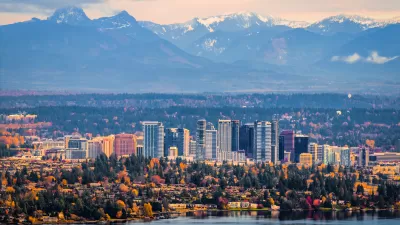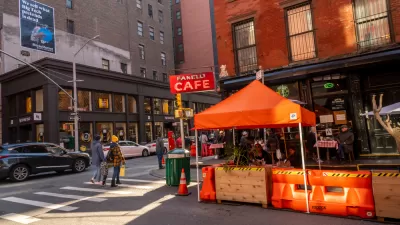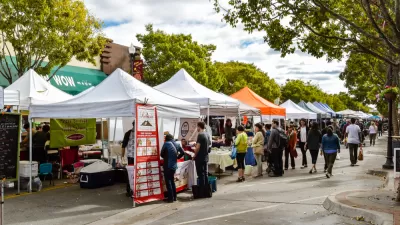In spite of concerns from business owners about losing parking, research shows that retail benefits from better bike and pedestrian infrastructure.

According to an article by David Zipper, "a growing body of evidence suggests that retailers ultimately come out ahead if their neighborhood becomes more inviting to shoppers arriving by foot, bike or transit." Thanks in part to pandemic-related programs that freed up street space for new uses, Zipper writes, the "privileged status that cars enjoy in urban shopping areas is being questioned as never before."
Zipper describes how various cities have repurposed former parking spaces and the reservations that some business owners still have about eliminating car parking. But data shows that business owners' fears, often based on their own experience and the assumption that most people drive to shops, are misplaced: a 2012 study in the Portland region "found that only 43% of bar patrons, 63% of restaurant customers and 58% of convenience store shoppers drove — the rest took transit, biked, or walked." In many urban settings, the customers that frequent small businesses don't drive to their destinations.
Research also shows that economic activity grows when bike infrastructure is installed. In Toronto, an analysis showed increased consumer spending after bike lanes were installed in one commercial district. Jeffrey Tumlin, the director of San Francisco’s Municipal Transportation Agency, suggests implementing small, reversible, community-informed pilot programs to ease business owners and other opponents into new street designs and show how parking conversion actually affects commerce.
FULL STORY: Note to Store Owners: Not All Holiday Shoppers Drive

Alabama: Trump Terminates Settlements for Black Communities Harmed By Raw Sewage
Trump deemed the landmark civil rights agreement “illegal DEI and environmental justice policy.”

Study: Maui’s Plan to Convert Vacation Rentals to Long-Term Housing Could Cause Nearly $1 Billion Economic Loss
The plan would reduce visitor accommodation by 25% resulting in 1,900 jobs lost.

Planetizen Federal Action Tracker
A weekly monitor of how Trump’s orders and actions are impacting planners and planning in America.

Waymo Gets Permission to Map SF’s Market Street
If allowed to operate on the traffic-restricted street, Waymo’s autonomous taxis would have a leg up over ride-hailing competitors — and counter the city’s efforts to grow bike and pedestrian on the thoroughfare.

Parklet Symposium Highlights the Success of Shared Spaces
Parklets got a boost during the Covid-19 pandemic, when the concept was translated to outdoor dining programs that offered restaurants a lifeline during the shutdown.

Federal Homelessness Agency Places Entire Staff on Leave
The U.S. Interagency Council on Homelessness is the only federal agency dedicated to preventing and ending homelessness.
Urban Design for Planners 1: Software Tools
This six-course series explores essential urban design concepts using open source software and equips planners with the tools they need to participate fully in the urban design process.
Planning for Universal Design
Learn the tools for implementing Universal Design in planning regulations.
Caltrans
Smith Gee Studio
Institute for Housing and Urban Development Studies (IHS)
City of Grandview
Harvard GSD Executive Education
Toledo-Lucas County Plan Commissions
Salt Lake City
NYU Wagner Graduate School of Public Service





























